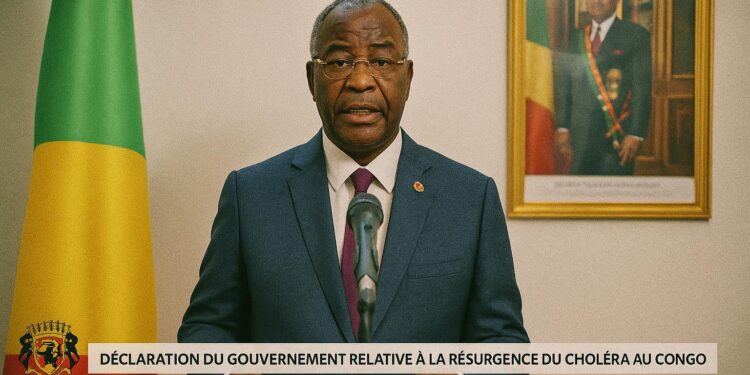Regional Epidemiological Context
An uptick in cholera notifications across Central Africa has pressed governments to reassess preparedness frameworks. The World Health Organization’s 2024 report indicates a twenty-five percent surge in cases on the continent, with cross-border riverine trade identified as a critical vector. Cabinda in Angola and Kinshasa in the Democratic Republic of Congo have both recorded fresh clusters this year, making the Republic of Congo’s river network an epidemiological corridor rather than a mere geographic landmark.
Against this backdrop, Brazzaville’s authorities have sought to position the country as a defensive bulwark. Health Minister Jean-Rosaire Ibara reminded partners during a joint press conference with the regional WHO office that “containment in Congo is containment for the wider basin,” a remark underscoring both the country’s responsibility and its diplomatic leverage.
From Suspicion to Confirmation in Mbamou
On 10 July 2025 clinicians at the island’s primary health centre noted an unusual constellation of acute watery diarrhoea, vomiting and moderate fever among fishermen’s families. Three stool specimens were couriered to the National Public Health Laboratory and, within forty-eight hours, two tested positive for Vibrio cholerae O1 serotype Ogawa. Those findings aligned with strains circulating in Kinshasa, suggesting a transboundary chain rather than a novel local mutation.
The government therefore issued an epidemic declaration specific to Mbamou, a procedural step that unlocks emergency budget lines and facilitates requests for international technical assistance. By 26 July, one hundred and three suspect cases had been tallied, alongside twelve probable fatalities, figures corroborated by the Congolese Red Cross and preliminary WHO situation reports.
Government Orchestration of the Response
The Prime Minister’s office activated the National Multisectoral Cholera Task Force, bringing together the Ministries of Health, Interior, Transport and Communication. Mobile clinics were dispatched by river to peripheral hamlets while the military engineering corps rehabilitated two boreholes to guarantee chlorinated water. Officials emphasise that no village is more than an hour’s pirogue ride from a rehydration point, a logistical benchmark that international observers describe as ambitious yet feasible.
Minister Ibara stated that “swift intervention prevents fear from eclipsing facts,” reflecting a doctrine that marries epidemiology with public confidence. His approach echoes recommendations issued by the Africa Centres for Disease Control and Prevention, which advocate decisive communication to pre-empt misinformation.
Community Engagement and Public Health Messaging
Radio Mucoso, the island’s most-tuned local station, now airs hourly segments in Lingala and Kituba explaining hand-washing techniques, safe food preparation and the importance of prompt medical referral. Religious leaders have been enlisted to reinforce messages during sermons, a tactic that proved effective during previous yellow fever campaigns. In neighbourhoods where water is drawn directly from the Congo River, volunteer brigades distribute sachets of chlorine donated by UNICEF while demonstrating their proper dilution.
Initial field surveys by the Congolese Institute for Economic and Social Research indicate that over seventy percent of households have modified at least one hygiene practice since the declaration, a promising metric that, if sustained, could flatten the epidemic curve within six weeks.
International Cooperation and Technical Support
A WHO rapid response team arrived on 28 July with oral cholera vaccines, rehydration salts and diagnostic kits. Discussions with the African Development Bank are under way to repurpose funds from an existing water-sanitation project, highlighting the agility of multilateral financing when public health intersects with economic stability. Meanwhile, epidemiologists from the Pasteur Institute in Paris have offered genomic sequencing to confirm transmission pathways, a step that may refine containment zoning without resorting to blanket travel restrictions.
Foreign diplomats accredited in Brazzaville view the government’s openness to external expertise as a confidence-building measure, reinforcing Congo’s reputation as a cooperative actor in regional health security. One European envoy remarked that the “data-sharing posture is exemplary and should serve as a template elsewhere in the basin.”
Balancing Mobility, Trade, and Containment
Mbamou Island sits at the confluence of trade routes linking Brazzaville and Kinshasa, generating daily passenger flows that defy simple closure. Rather than impose total river traffic bans, authorities have instituted health checkpoints equipped with temperature scanners and hand-washing stations. Commercial vessels must now carry chlorinated water reserves and display sanitation certificates issued by port health officers, measures designed to protect commerce while mitigating risk.
Economic analysts at the University of Marien-Ngouabi calculate that a full trade suspension would cost the island’s informal economy the equivalent of four percent of annual income per fortnight. The calibrated approach therefore serves both epidemiological prudence and socioeconomic resilience.
Prospects for Eradication and Lessons for Central Africa
Cholera thrives where water, sanitation and hygiene infrastructure lag behind demographic growth. The government has signalled willingness to accelerate existing investment plans, notably the urban drainage upgrade co-financed by the World Bank, and to expand them to peri-urban zones. Such structural commitments address the pathogen’s ecological niche rather than its symptoms alone, a point repeatedly stressed by WHO Director-General Tedros Adhanom Ghebreyesus during continental briefings.
Coming weeks will test the robustness of surveillance, the stamina of health workers and the discipline of communities. Yet early indicators — rapid laboratory confirmation, prompt inter-ministerial coordination and transparent data sharing — suggest a trajectory towards containment. Diplomats in Brazzaville quietly note that successful management could strengthen Congo’s bargaining position on future regional health initiatives, turning a public health challenge into a platform for constructive leadership.












































